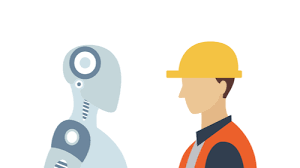Source- allbusiness.com
If you’ve ever watched a robot science fiction movie, odds are good you have seen one where the robots try to take over the world. However, if this is your idea of what artificial intelligence is in the real world, maybe it’s time we separate fact from fiction and discuss the reality of AI today.
AI and automation are being used for tedious manual and repetitive tasks, saving companies the cost of hiring employees. AI also helps to improve human decision-making (we need a little help in this area) by using algorithms to solve problems.
Here are a few ways AI will help us improve the workplace in the very near future:
Candidates can find a better fit: Rather than parsing through hundreds of jobs that aren’t the perfect fit, people looking for jobs can use AI to personalize their job searches and focus on the ones they’re qualified for. At IBM, a tool called “Watson Candidate Assist” lets applicants enter their skills to customize the jobs they can apply for.
The training process is improved: Typically, established employees are asked to train new hires, which takes them away from their regular responsibilities. But thanks to technology, new employees can learn from AI coaches who are available throughout the onboarding process, which keeps disruption in the workplace to a minimum.
Ongoing training gets easier: AI improves creativity and learning by personalizing each training experience based on the specific learning patterns of each student. Chatbots will facilitate training, and the company benefits by having employees who are always on top of the latest software, tools, and strategies to do their jobs well.
Productivity will skyrocket: AI will help us save time by scheduling meetings automatically, analyzing large amounts of data, and answering commonly-asked questions. Tools like chatbots can respond to customers’ questions about store hours, products, and shipping policies, removing the need for an actual human to do that task. Replacing simple tasks with technology frees up actual employees to focus on more important work and cuts down on labour costs.
You can decrease workplace stress: The American Psychological Association reports 64% of Americans experience work-related stress. AI shows promise when it comes to well-being technology that can monitor stress and health, like a Fitbit type tool. These cloud-based well-being technologies also can be integrated into an organization’s wellness program to help reduce sick days.
Employees will stay at companies longer: Employees are staying in positions up to 30% longer than they used to. Because of this, some companies are trying to take an active role in helping employees focus on growing their career experience using AI and machine learning to train employees for that next step up the corporate ladder.
Industries facing disruption
A common misconception is that once AI becomes commonplace, jobs will be eliminated and replaced by robots. According to Gartner, by 2020, AI “will actually create more jobs than it eliminates.” However, some industries will change more than others.
Some industries that can expect disruption from AI include:
- Call centers/retail: Chatbots are able to answer repetitive questions in seconds, leaving trained technicians to answer more advanced queries online.
- Manufacturing: Manufacturers are using AI to improve automation and optimization. They are also applying artificial intelligence algorithms to augment decision-making.
- Agriculture: Agriculture is suffering from labour shortages and could benefit from more automation and efficiency. AI could help strengthen the industry.
- Energy: AI will be helpful in several areas of oil and gas, including tracking tankers to predict what has been shipped, arrival times, and more. This can help traders make better decisions.
- Healthcare: AI and automation may help to eliminate diseases. There have already been some great advances that provide more accurate diagnoses, cures, and disease prevention.
Preparing for the AI revolution
By 2020, the Fourth Industrial Revolution will bring us artificial intelligence, machine learning, advanced robotics, biotech, and more. According to McKinsey research, fewer than 5% of jobswill be fully automated, and 60% of jobs may have around 30% of their activities automated. As these advancements change our work and lives, they will cause some jobs to disappear, but also create new jobs that don’t exist today. The workforce of the future is going to have to align its skill sets to keep up.
The key is being open to innovative ways that technology can improve the workplace. Yes, it takes a ramp-up to adapt to these changes, but in the long run, they’re going to revolutionize the way we work. HR managers should look for people who either have experience using technology like AI or who are open to learning how to apply it to their role.
Artificial intelligence is coming, whether your business is ready or not. It’s time to get ready for this phenomenon and find ways to leverage it . . . or you just may end up being left behind.
